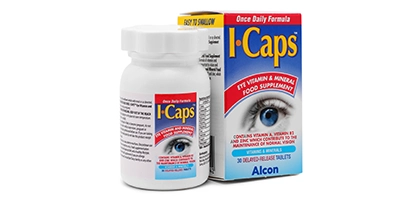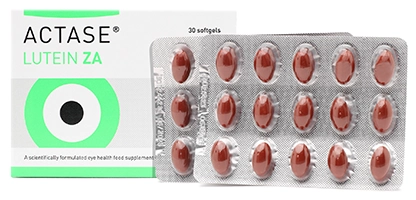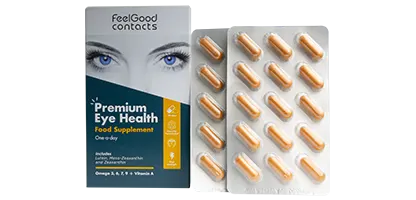A healthy diet and exercise routine are important factors in keeping your eyes in good working condition, but supplementing is also an option for those who cannot achieve a balanced diet that includes all the nutrients they need to remain healthy.
How can vitamins support my eye health?
Eye vitamins can contribute towards supporting good eye health, so it’s worth considering adding some eye supplements to your routine. Taking vitamins for eyes could also minimise your risk of developing certain eye conditions such as glaucoma, cataracts and age-related macular degeneration (AMD).
What are the best vitamins for eyes?
There are a lot of vitamins out there, so you might be wondering, what vitamin is good for your eyes? A balanced and varied diet should help you get all the eye vitamins you need to support good eye health, but we know that achieving that balance can be difficult, particularly for those with busy lifestyles. Supplements are an excellent way to ensure you get all the nutrients you need to keep your eyes in good condition and minimise the risk of developing eye diseases.
Does vitamin B12 improve eyesight?
Research from the National Library of Medicine suggests that high doses of vitamin B12 may promote the development of glaucoma. Conversely, a lack of vitamin B12 may lead to neurological issues, which could cause vision problems as a result.
Foods naturally containing B12 include:
- Fish
- Meat
- Eggs
- Dairy
- Fortified breakfast cereals
- Nutritional yeast
Can vitamin A improve eyesight?
Vitamin A is a vital component for good eye health. Vitamin A allows your eyes to see the full spectrum of light. Deficiency in this vitamin could cause night blindness which would make it very difficult to see in low light conditions.
Foods that naturally contain vitamin A include:
- Dark leafy greens (like spinach)
- Red bell pepper
- Mango
- Milk
- Eggs
Vitamin B and D – reduce your risk of AMD
Including vitamin B and D in your diet could reduce your risk of developing age-related macular degeneration (AMD), a condition that causes blurry or vision loss in the central part of your sight.
Although vitamin D can be found in foods like salmon, mackeral and sardines, the best source of vitamin D is actually from the sun. In places where there isn’t much sun throughout the year (like the UK) it’s advisable to supplement with vitamin D in the winter months.
Foods that naturally contain vitamin B include:
- Peas
- Bananas
- Oranges
- Nuts
- Wholegrain bread
- Liver
- Some fortified breakfast cereals
Vitamin C and E – reduce the risk of cataracts
Including vitamin C and E in your diet will help to reduce your risk of developing cataracts, a condition that causes the lens of the eye to become cloudy and leads to blurry vision.
- Citrus fruits like oranges and kiwi
- Tomatoes
- Bell pepper
- Strawberries
- Broccoli
- Cabbage
- White potatoes
Lutein and zeaxanthin – prevent AMD
Dark green vegetables are rich in lutein and zeaxanthin, two essential vitamins for helping your eyes to filter out blue light and prevent the development of AMD. With dietary restrictions, personal preference and lifestyle, it can be difficult to include these foods in your diet on a regular basis, that’s why supplementing is such a great convenient option for many.
Foods that naturally contain Lutein and zeaxanthin include:
Omega-3 essential fatty acids
Omega 3 and essential fatty acids are excellent for reducing the symptoms of dry eye and AMD.
The best eye vitamins for blurry vision
If for whatever reason you can get achieve a balanced and varied diet. Here are some of the best supplements for eye health.
The Eye Doctor Premium Eye Health Food Supplement

 Offers
Offers Account
Account
 Favorite
Favorite
 Basket
Basket

 OFFERS
OFFERS













